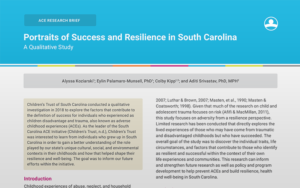A research brief based on a 2018 study exploring the factors for success for individuals who experienced trauma as children was recently posted to the Children’s Trust website. Alyssa Koziarski, a Children’s Trust research and evaluation assistant and the primary author of the brief, answers five questions about the significance of this research.

Alyssa Koziarski
What does the research brief cover?
This research brief details the results of a qualitative study conducted at Children’s Trust in 2018 to understand how individuals in South Carolina were resilient and successful despite experiencing adverse childhood experiences (ACEs). It details interview themes and quotes as well as implications for programs, policy and future research on ACEs.
How many individuals were interviewed? Where do they reside?
Nineteen people were interviewed and asked various questions around the individual traits, life circumstances and contextual factors that contributed to their personal resilience and success in adulthood. Each participant currently resides in South Carolina, and interviews were conducted within the state.
Why is the study and research brief important for our communities?
As we continue to build resilient communities and prevent child abuse, neglect and injury in South Carolina, it is important to consider and utilize the perspectives of those who experienced childhood disadvantage. As we work to mitigate the effects of ACEs, the perspectives of those displaying resilience can aid in future programs, policy and research.
What are ACEs?
Adverse childhood experiences are traumatic events that occur in a child’s life prior to age 18. Research shows that adversity resulting from ACEs can harm a child’s development and result in long-term negative health and social outcomes.
Examples of ACEs include emotional, physical and sexual abuse; substance use and mental illness within the household; domestic violence; parental separation such as divorce or incarceration; food insecurity; and homelessness. ACEs are linked to chronic health problems, mental illness, depression, addiction issues, and employment concerns in adulthood.
The South Carolina ACE Initiative aims to help children and families overcome the effects of traumatic experiences, prevent poor health outcomes, and promote overall well-being.
What is a qualitative study?
A qualitative study uses non-numerical data such as interview quotes or written records from individuals to support research. It provides insights into an issue or problem, and it is used to help understand people’s beliefs, experiences, attitudes, behaviors, and interactions. In this particular study, it is used to give voices to the participants who have ACEs and fully capture their lived experiences.
Read full research brief: Portraits of Success and Resilience in South Carolina (PDF)






